From Charity into the Depths of Justice: Transformation at the Ignatian Family Teach-In for Justice
BY CAITLIN WRIGHT | December 5, 2017
I’m not a morning person. I have never been, and I highly doubt I ever will be. But when I saw that I could travel between New York City and Washington, D.C. for just $14 if I booked my return trip for 4 am on a Monday, I clicked the confirmation button without a second thought. I am on a Jesuit Volunteer budget, after all. So, the first weekend of November, I packed my bags, caught the Megabus in Manhattan, and headed to the nation’s capital for one of my favorite events of the year: the Ignatian Family Teach-In For Justice (IFTJ).
To an outsider, I would imagine that IFTJ looks absolutely nuts. But to me, it appears as the brink of a revolution. Thousands of members of Jesuit institutions and the church at large, primarily consisting of high school and university students, converge for a massive conference on major social justice initiatives, organized by the Ignatian Solidarity Network.
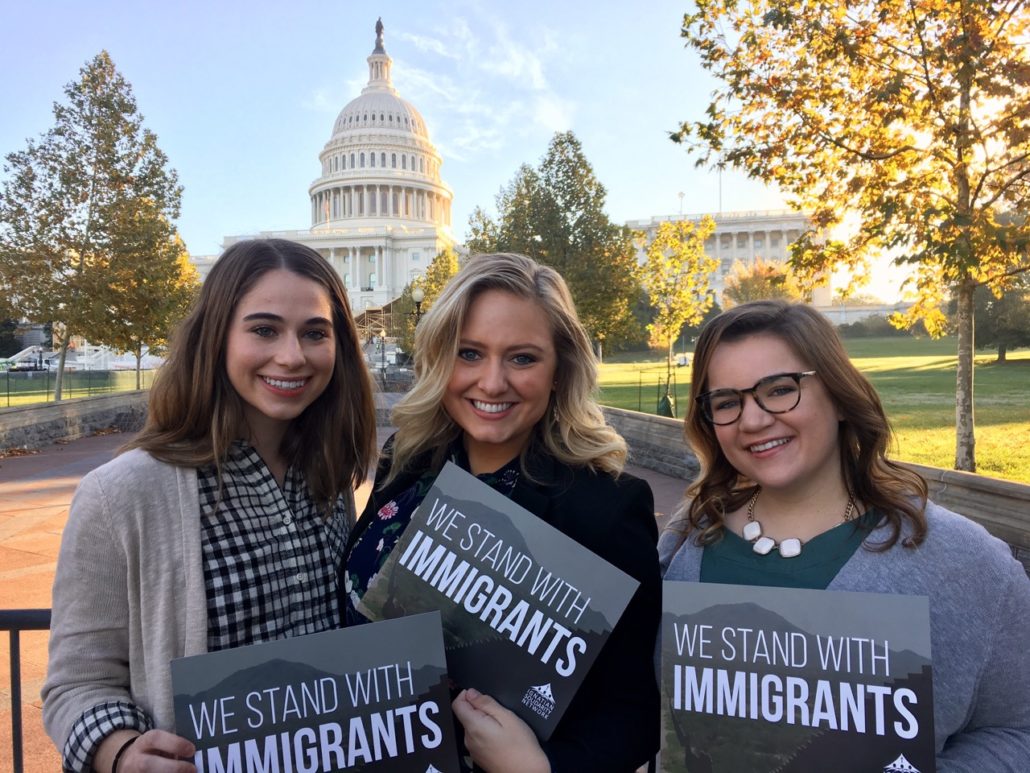
The author (right) at the 2016 Ignatian Family Teach-In for Justice.
This year’s theme, “Rowing Into the Deep,” encouraged attendees to view justice with a consideration of the Jesuit value of magis, meaning “the more.” This can be difficult to grasp, as the definitions of both justice and magis are nuanced and complex. In fact, the meanings of these terms may change depending on the person you ask to define them. However, whether a naive high school student from a wealthy white suburb in the Midwest or a university student embracing the ideals she has nurtured throughout her collegiate education, all have something to learn. I know, because I have been a member of both ends of the spectrum.
Before I began my journey with the Jesuits, I was a student at a public high school in suburban Minnesota. And though one of the largest high schools in the state, the student population was approximately 90% white and conveniently existed in an upper socioeconomic class. Though I adore my high school and am very proud of the education I received there, as a teenager, I was unable to see beyond my own realm. I let my ignorance lead me to believe in unjust social customs.
When I went to deliver food to the homeless, I scrutinized why they didn’t want to obtain jobs instead of pondering how the cycle of oppression impacted their chances toward upward mobility. Through my local parish, I went on three mission trips and felt a great deal of personal satisfaction in completing menial household tasks for a handful of strangers. But the homeowners remained strangers because I was unable to see the greater worth in acknowledging them on a personal level. I didn’t even know their names. I didn’t ask. In my bubble, acts of charity remained without any glimpse of justice. And that was ok with me—that is, until my enrollment at a Jesuit institution of higher learning, Creighton University.
After three years of learning from brilliant minds and fostering camaraderie with people from a multitude of backgrounds, I attended IFTJ for the first time as a senior at Creighton. On Advocacy Day, my legislative team met with staffers from Nebraska Senator Ben Sasse’s office to discuss comprehensive immigration reform. I had garnered a passion for immigration advocacy throughout my collegiate career. By means of a service and justice trip to El Paso, TX, a study abroad program in Peru, and a summer internship with a local non-profit’s immigrant and refugee action team, I came to think of myself as an immigration wizard, boasting my wisdom far and wide.
This was a far cry from the closed-minded, conservative mindset I once held in high school. But, even after my remarkable transformation, I still managed to display bouts of naivety disguised as pride, because it only took me three months into a year of service with the Jesuit Volunteer Corps to recognize just how little I had actually known about immigration at my first Teach-In.
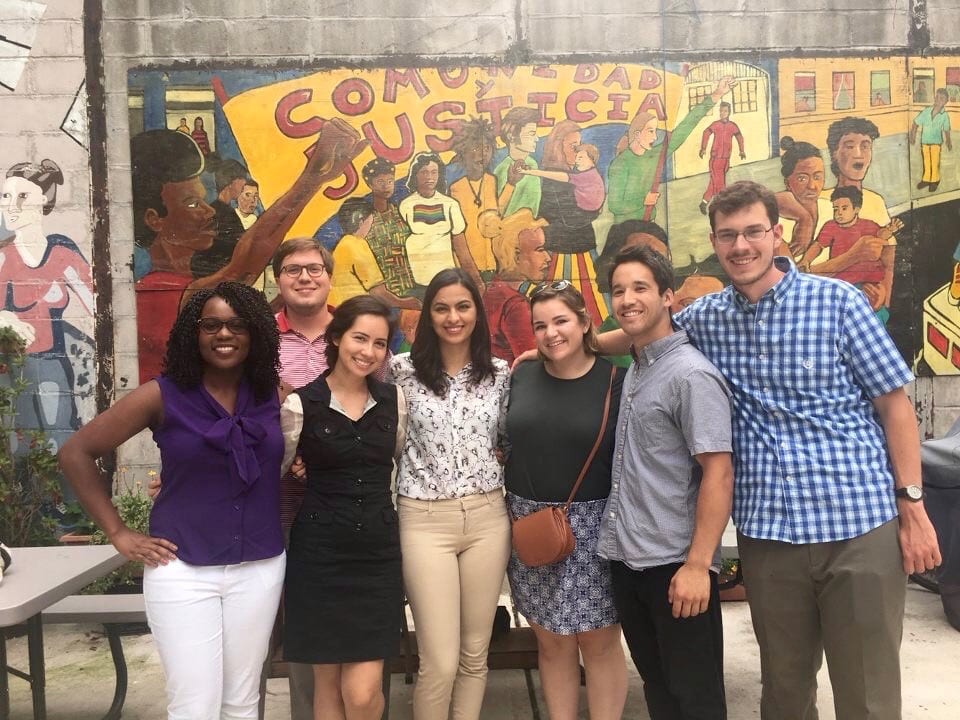
The author with fellow Jesuit volunteers.
Immigration is…tricky, to say the least. And it is utterly impossible to have a firm grasp on all it entails. When I met with Senator Sasse’s office a week after the 2016 presidential election, I pled my case for comprehensive immigration reform without having a clear image of what that should encompass. In fact, I wasn’t even sure of the difference between undocumented migrants, Green Card holders, asylees, refugees, and DACA recipients.
Now, as a Jesuit Volunteer, I serve with Catholic Migration Services in Brooklyn, New York. My work consists primarily of aiding in the naturalization process. Essentially, I meet with clients, determine whether they are eligible to apply for citizenship and work with them to complete the proper forms. My first few weeks at the agency were spent diligently taking notes on extensive materials regarding the pathways to citizenship in the United States. I am still quite far from knowing everything, but in the progress I have made since my first Teach-In, I am able to see the frustrating, beautiful, and vital role of recognizing my own lack of awareness. Before I could “row into the deep,” I had to be willing to break myself down and build myself up once again.
Herein lies my absolute favorite part of IFTJ: witnessing people meet this challenge for the first time.
Arriving fashionably late to one of the breakout sessions because the Starbucks line was far too long (I have no one to blame but myself), I snuck in just in time to witness a boy from a Jesuit high school in the Southwest apprehensively raise his hand. Nervously, he expressed the shock he had faced in the first two days of the conference. He explained that, as a white male from a wealthy area, he had never felt uncomfortable in the face of adversity, but now, he was uncomfortable. He was unsure not only of how to help but of how to approach human rights initiatives at all. These are the moments in which I smile because feeling confusion and frustration is the absolutely essential first step. And it is a step we are greeted with time and time again. By asking these kinds of questions, we can observe that the student has at least the most minimal desire to see beyond himself, to work not only for others but with others. This is how I changed from an adolescent who had never met a non-U.S. Citizen to a college student whose eyes were opened on the border in El Paso to a Jesuit Volunteer who works on behalf of migrants. The transformation does not happen all at once, nor is it an easy development, but its results are exceptionally worthwhile.
We must be careful not to find ourselves stuck in the depths of vexation, though. If we cannot move from the initial disturbance—beyond the first step—we will never proceed in our commitment to justice. And, just like remaining in the beginning stages, we must be aware that we may never reach a place in which we feel comfortable. Feeling comfortable allows for complacency. This was evident in my thinking that I had a vast knowledge of immigration policies and becoming a Jesuit Volunteer only to realize I knew close to nothing. But I’m here to say that this is ok. In fact, it’s more than ok.
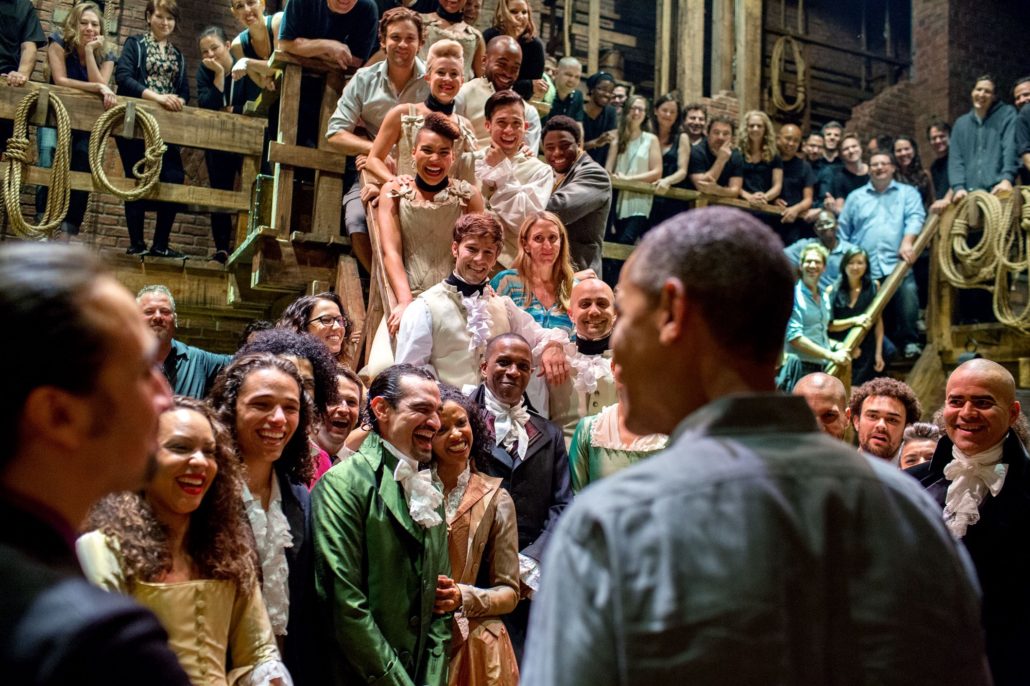
The cast of Hamilton and former Presdient Barack Obama.
Even Lin-Manuel Miranda, famed Broadway composer and star and immigration advocate, elucidates in Hamilton: “I’m never satisfied.” This un-satisfaction leads to the magis that we Jesuit-educated folks mention over and over again. We can achieve “the more” if, and only if, we really want it in the first place. Then, we may act upon this thirst by questioning ourselves and the structures we reside in. Once again, to cite Hamilton (sorry, I’m just a little obsessed), “This is not a moment, it’s the movement.” We do not live in individual, stagnant periods of time, but rather contribute to the collective present and the infinite amount of lifetimes to come. Pretty mind-blowing, isn’t it?
Now, miles and weeks away from the Ignatian Family Teach-in For Justice, I think about the future of that boy back in D.C. Is he still asking questions? Where will his questions lead him? As long as he’s with the Jesuits, I have no fear, and I do hope he feels encouraged to let his dissatisfaction ruminate into a pursuit of magis. This pursuit of “rowing into the deep,” I’m sure, will result in efforts toward solidarity and justice.
I myself once knew a girl who allowed herself to be torn down and built back up by those dastardly folks from the Society of Jesus. I heard she’s a Jesuit Volunteer now in Brooklyn….
#JVReflects explores the intersection of faith and justice from the perspective of JESUIT VOLUNTEERS serving as long-term volunteers both domestically and internationally with Jesuit Volunteer Corps and Jesuit Volunteer Corps Northwest. Reflections specifically focus on the cornerstone values of the Jesuit volunteer experience: spirituality, simple living, community, and social justice.
Caitlin Wright considers herself an aficionado for all things Jesuit. After graduating from Creighton University (Go Jays!) in 2017 with a degree in English, Spanish, and Legal Studies, Caitlin completed a year of service with the Jesuit Volunteer Corps in Brooklyn, NY. She continues to reside in Brooklyn and works as an immigration counselor at Catholic Migration Services, a not-for-profit organization that provides legal aid to migrants in Brooklyn and Queens. In her free time, Caitlin enjoys going to Broadway shows, singing with the schola at the Church of St. Francis Xavier, and finding the best bagels New York has to offer.

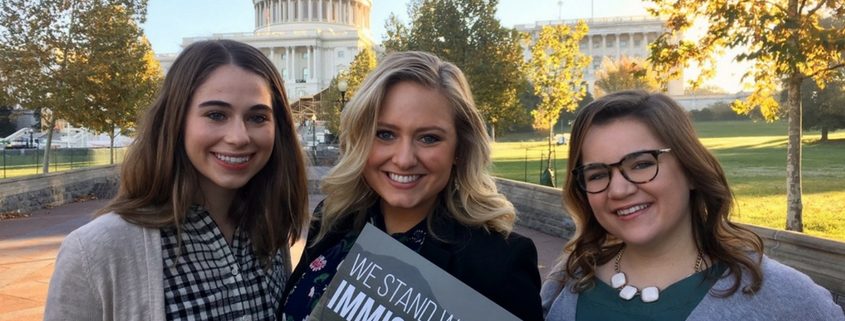
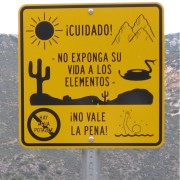
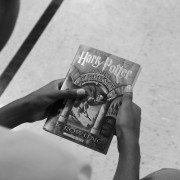
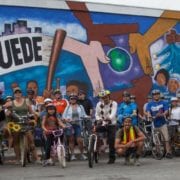
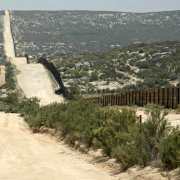
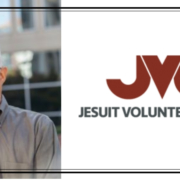


Working for justice is a calling second to none.